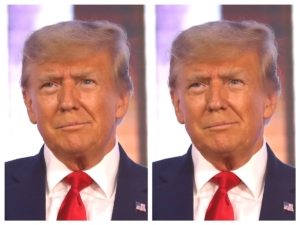President Donald Trump’s latest executive order targeting homelessness is drawing sharp rebukes from Democrats and advocates who say it promotes forced institutionalization and relies on harmful stereotypes rather than solutions.
The order, signed last week, calls on federal agencies to redirect funding toward cities that aggressively crack down on street encampments and public drug use. It suggests this could include involuntary commitment to mental health or addiction facilities, without the individual’s consent.
“Shifting these individuals into long-term institutional settings for humane treatment is the most proven way to restore public order,” the order reads. Trump’s directive claims that doing nothing lacks compassion and that more assertive steps are necessary to ensure public safety.
READ ALSO: Trump administration’s cancellation of humanities grants temporarily blocked by judge
Critics, however, argue the plan is punitive and vague, unlikely to reduce homelessness or address its root causes. They also point out that some of the very policies Trump promotes are already underway in progressive states like California, despite his frequent attacks on them.
Watch a recent episode of The BreakDown podcast below and subscribe to our channel PanaGenius TV for latest episodes.
Gov. Gavin Newsom has invested heavily in mental health and addiction treatment initiatives while ordering cities to clean up homeless encampments. Responding to the federal directive, his office blasted Trump’s approach as performative.
“But, his imitation (even poorly executed) is the highest form of flattery,” said Tara Gallegos, a spokesperson for the governor. She accused the order of recycling strategies already in use and prioritizing “distracting headlines and settling old scores.”
San Francisco Mayor Daniel Lurie, meanwhile, has pushed bans on RV dwelling and emphasized cleaner, safer streets by urging the unhoused to accept shelter. In neighboring San Jose, Mayor Matt Mahan recently introduced a rule allowing jail time for individuals who reject three offers of shelter.
The executive order specifically instructs Attorney General Pam Bondi and the secretaries of Health, Housing, and Transportation to prioritize grants for jurisdictions that enforce laws against open drug use and camping.
Devon Kurtz, public safety policy director at the conservative Cicero Institute, which helped shape many of the order’s provisions, welcomed the announcement.
“It’s a clear message to these communities that were still sort of uncomfortable because it was such a big change in policy,” Kurtz said. He noted that California cities had already begun banning encampments after a U.S. Supreme Court ruling last year cleared the way for such actions, but added that Trump’s order adds “teeth” to those efforts.
The Supreme Court decision made it easier for cities to remove encampments even if no alternative housing was available, setting the stage for more aggressive policies nationwide.
But homeless advocacy groups fear the order opens the door to mass institutionalization, a practice largely abandoned decades ago due to ethical and financial concerns.
“What is problematic about this executive order is not so much that law enforcement is involved — it’s what it calls on law enforcement to do, which is to forcibly lock people up,” said Steve Berg of the National Alliance to End Homelessness. “That’s not the right approach to dealing with homelessness.”
Los Angeles Mayor Karen Bass also rejected the order’s premise. Though her administration has worked to reduce street homelessness, she said real progress comes from collaboration, not criminalization.
“Moving people from one street to the next or from the street to jail and back again will not solve this problem,” Bass said in an AP report.
READ ALSO: Judge halts Trump’s birthright citizenship order in third major blow










